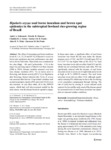Use este identificador para citar ou linkar para este item:
http://www.alice.cnptia.embrapa.br/alice/handle/doc/1038437| Título: | Bipolaris oryzae seed borne inoculum and brown spot epidemics in the subtropical lowland rice-growing region of Brazil. |
| Autoria: | SCHWANCK, A. A.  MENESES, P. R.   FARIAS, C. R. J. de   FUNCK, G. R. D.   MAIA, A. de H. N.   PONTE, E. M. del   |
| Afiliação: | ANDRE AGUIAR SCHWANCK, UFRGS; PRISCILA ROSSATTO MENESES, UFPEL; CANDIDA RENATA JACOBSEN DE FARIAS, UFPEL; GUSTAVO RODRIGO DALTROZO FUNCK, Instituto Riograndense do Arroz; ALINE DE HOLANDA NUNES MAIA, CNPMA; EMERSON MEDEIROS DEL PONTE, UFV. |
| Ano de publicação: | 2015 |
| Referência: | European Journal of Plant Pathology, Dordrecht, v. 142, n. 4, p. 875-885, 2015. |
| Conteúdo: | The effect of increasing seed borne incidence levels (0, 3, 6, 12, 24 and 48 %) of Bipolaris oryzae on brown spot epidemics and crop performance was studied in eleven field trials. These trials were conducted at two sites (Bagé ? BA and Cachoeirinha ? CA) in the major rice-growing region of Brazil over three seasons (2008 to 2010). Disease variables assessed over time were disease incidence (INC, %) on leaves prior to flowering, and disease severity (SEV, %) on flag leaves after flowering. Kernel infection (KI, %) by B. oryzae was assessed after harvest. Crop-related variables such as plant population density (PD) and yield (YLD) were also assessed. In only three trials, all in the 2009/10 season, which had well above-normal rainfall in the early season, was the disease found at vegetative stages. In those same trials, a significant effect of seed borne inoculum was found for the area under the disease progress curve of INC and SEV. Overall mean SEV at CA (1.67 %) was higher than at BA (0.22 %). Seed borne inoculum levels did not affect final SEV and KI, which was not correlated between each other. PD was significantly reduced with the increase of seed borne inoculum levels in seven out of eight trials and at levels as high as 48 % (2009/10 season). The seed borne inoculum levels did not affect YLD, although significantly reducing PD, which may be due to the rice having a low population compensated through tillering. The risk of yield loss by sowing B. oryzae-infected seeds seems to be low and the early onset of the disease caused by increased levels of seed borne inoculum was dependent on seasonal weather conditions. |
| Thesagro: | Arroz Mancha parda Doença de planta Modelo matemático Oryza Sativa |
| NAL Thesaurus: | Seed pathology Fungal brown spot Linear models |
| Palavras-chave: | Generalized linear mixed model Tolerance standards |
| Tipo do material: | Artigo de periódico |
| Acesso: | openAccess |
| Aparece nas coleções: | Artigo em periódico indexado (CNPMA)  |
Arquivos associados a este item:
| Arquivo | Descrição | Tamanho | Formato | |
|---|---|---|---|---|
| 2015AP044.pdf | 269,98 kB | Adobe PDF |  Visualizar/Abrir |









